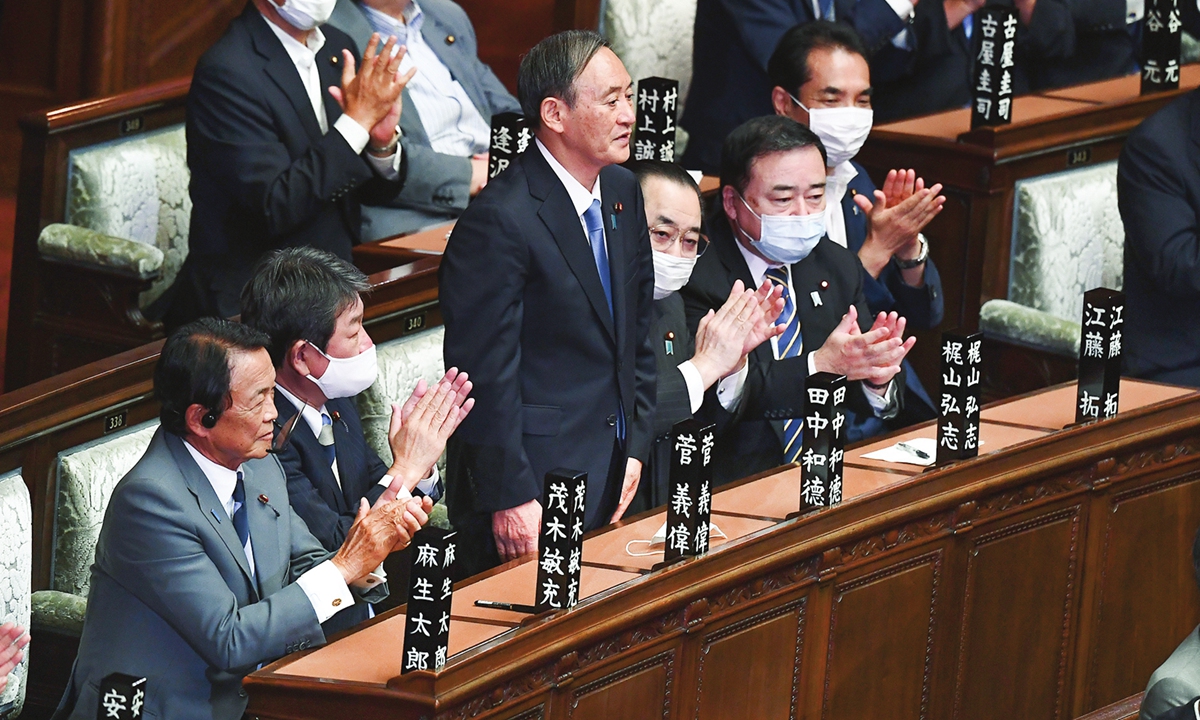Beijing ‘composed’ over Japan-US alliance
By Zhang Han Source: Global Times Published: 2020/9/20 22:21:12

Yoshihide Suga (center) is inaugurated Japan's 99th Prime Minister on Wednesday. Photo: AFP
Japanese Prime Minister Yoshihide Suga talked with US President Donald Trump on Sunday night via phone, and stated the Japan-US alliance remains the cornerstone of Tokyo's foreign policy. But Japan will also try to retain stable relations with China to gain the maximum interest for its own development, and China just needs to closely monitor the situation with strategic composure, Chinese analysts said.
Suga and Trump affirmed the importance of the alliance between the two countries and agreed to coordinate on issues including the fight against COVID-19, Kyodo reported.
Given that Japan's security and crucial auto industry are highly dependent on the US, the major trend of the Japan-US alliance and close bilateral ties will remain the same, Chinese analysts said.
New Japanese prime ministers usually visit the US soon after they take office, but the pandemic may force Suga and Trump to communicate via phone.
Analysts also noted that Japan does not want to inflame the situation in East Asia, which will harm its own interests — meaning the Suga government is unwilling to contain China as the US expects, or stir up trouble in the Taiwan Straits, where China and the US are having a fierce confrontation.
After the change in Japanese political circles, former Japanese prime minister Yoshiro Mori made a visit to the island of Taiwan. Kyodo News Agency reported that Mori met with the regional leader of the island Tsai Ing-wen and told Tsai that the Japanese leader wants to have a phone call with her.
China contacted Japan to clarify the report and Japan replied that such a call would absolutely not happen, China's Foreign Ministry said on Saturday.
Liu Junhong, a research fellow at the China Institutes of Contemporary International Relations in Beijing who specializes in Japan-related issues, told the Global Times on Sunday that Japan does not want a long-lasting standoff or out-of-control friction in the Taiwan Straits.
"Japan wants to show its presence in the region and if the China-US confrontation continues, it may serve as a mediator," Liu said.
Tsai also denied on Sunday that the island and Japan discussed the issue and said that the two sides had no plan for a phone conversation.
In this sensitive situation, any provocative move should be avoided, analysts said, noting that Taiwan should not regard Mori's visit to the island, without an official role, as "a form of support."
Analysts predicted when Suga was voted the prime minister, setbacks may occur in China-Japan relations as there are unsettled problems, such as historical issues and territorial disputes.
Shinzo Abe, who just stepped down as Japan's prime minister last Wednesday, visited the Yasukuni Shirne on Saturday, triggering a flood of criticism on Chinese social media. The last time Abe visited the shrine was December 2013.
It is believed that Abe avoided visiting the shine during his recent years in office in order not to aggravate China or South Korea. "Abe's latest visit is a make-up for his past shunning of the site and a gesture to satisfy domestic right-wing forces. He also wanted to emphasize his political ethos and stance," Zhou Yongsheng, a professor of China Foreign Affairs University, told the Global Times.
Zhou said Abe's visit to the shrine could be a hint to the incoming Suga, suggesting that he shouldn't visit the shrine while in the post of prime minister. As a prestigious politician with huge influence, his visit could have a far-reaching impact on Japan's future leaders and politicians, soft in tactics but hard-line instance, Zhou said.
Posted in: DIPLOMACY